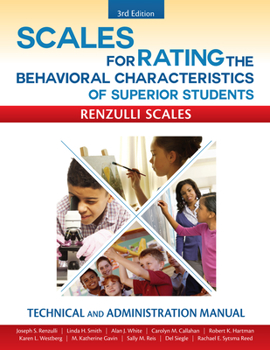Scales for Rating the Behavioral Characteristics of Superior Students: Technical and Administration Manual
This is the Technical and Administration Manual for the Scales for Rating the Behavioral Characteristics of Superior Students. The Scales for Rating the Behavioral Characteristics of Superior Students are commonly referred to as the Renzulli Scales or Renzulli-Hartman Scales.Now in its third edition, the Renzulli Scales are the nation's most popular tool for identifying gifted children. Supported by 40 years of research, the Renzulli Scales are used by gifted and talented programs across the country. This standardized instrument is completed by teachers and provides an effective method for identifying gifted children. The Scales for Rating the Behavioral Characteristics of Superior Students: Technical and Administration Manual includes technical information about how the scales were developed as well as guidelines for using the scales. The manual includes a review of the supporting research for the instrument, field test data, and construct validity support. The manual also includes in-depth information about administering the Renzulli Scales and interpreting the results. The manual features extensive appendices that include reproducible teacher training activities to help teachers understand how to use the scales and rate students, easy-to-follow instructions on how to establish local norms in a school or district, and a practical plan for identifying students for gifted and talented programs. The Renzulli Scales are designed to obtain teacher estimates of a student's characteristics in the following areas: Learning Characteristics Creativity Characteristics Motivation Characteristics Leadership Characteristics Artistic Characteristics Musical Characteristics Dramatics Characteristics Communication Characteristics (Precision) Communication Characteristics (Expressiveness) Planning Characteristics Mathematics Characteristics Reading Characteristics Technology Characteristics Science CharacteristicsEach scale contains multiple items that are rated using a Likert-type scale. The first four scales (learning, creativity, motivation, and leadership) are used by most schools that use the Scales. The remaining 10 scales are focused on specific areas. They are used by schools when those areas seem appropriate for a gifted program's goals. For example, a program serving gifted math students would use the mathematics scale, a science academy would use the science scale, etc. Research shows that gifted children tend to exhibit certain observable behaviors, such as using advanced vocabulary, grasping underlying principles, and making generalizations from complex information. The Renzulli Scales asks teachers to rate children in comparison to their peers on a host of these observable behaviors. The children who score high on the scales are more likely to be gifted. Using a tool like the Scales, a school can narrow the number of students who will be fully evaluated for a gifted program. The items were chosen from a comprehensive body of research concerning the characteristics of gifted students. Based on a multiple talent approach to the identification of gifted students, the scales help identify student strengths. This is the Technical and Administration Manual only. To explore the full collection of Renzulli Scales print and online resources, please visit: https: //www.routledge.com/go/scales-for-rating-the-behavioral-characteristics-of-superior-students.
Format:Paperback
Language:English
ISBN:0936386908
ISBN13:9780936386904
Release Date:November 2002
Publisher:Routledge
Length:106 Pages
Weight:0.50 lbs.
Dimensions:0.2" x 8.5" x 11.0"
Customer Reviews
0 rating





